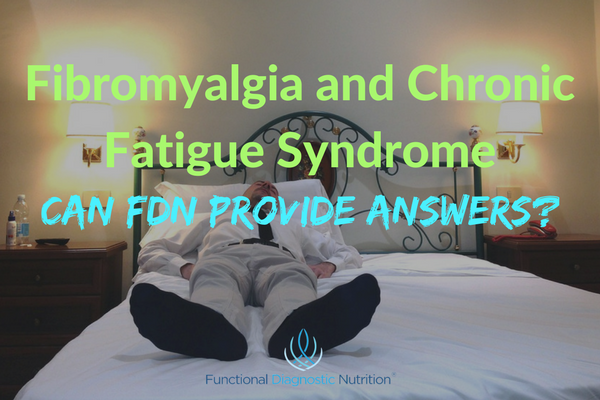A growing number of people are being diagnosed with fibromyalgia and Chronic Fatigue Syndrome. Because of this, it’s important to take a look and see how FDN may provide answers for those who are suffering.
Fibromyalgia is an extremely limiting condition. Those diagnosed can experience intense, chronic musculoskeletal pain and severe fatigue, often accompanied by depression, anxiety and insomnia. This functional syndrome is commonly lumped together with Chronic Fatigue Syndrome. Both problems can be managed with medication, and various modalities may provide additional relief for some patients. The question is, to what extent can addressing underlying dysfunctions using Functional Diagnostic Nutrition® (FDN) help restore normal, healthy function? And can following an FDN protocol return the patient to a state of health and balance?
Even though differences exist, many health practitioners use the terms fibromyalgia and Chronic Fatigue Syndrome interchangeably. Chronic Fatigue Syndrome (CFS), is a condition characterized primarily by prolonged, persistent, overwhelming fatigue that cannot be alleviated. Muscle aches and flu-like symptoms are also common in people with CFS. Both syndromes make ordinary life activities extremely strenuous and difficult. Walking up a flight of stairs, getting up from a chair or shopping for groceries can be daunting tasks to a person suffering from fibromyalgia or CFS.
How many are really being impacted?
It is believed that these syndromes affect approximately 6-8% of the population. However, those numbers could be much higher, as there is no absolute test or diagnosis for fibromyalgia and CFS. Patients with similar symptoms may be diagnosed with any combination of fibromyalgia and/or CFS, chronic myofascial pain, Chronic Pain Syndrome, Lupus, arthritis or even clinical depression. Fibromyalgia and CFS are 8 times more common in women than men. And they typically develop between the ages of thirty and fifty. Onset often occurs around the start of perimenopause or menopause. This could be a clue, as it correlates with declining hormonal levels and hormonal imbalances.
Both conditions are among the most frustrating chronic health issues anyone can suffer from. Either condition can interfere with one’s physical, mental and social well-being. To make matters worse, there is no definitive testing, diagnosis nor standardized treatments available. Because standard blood tests often appear “normal,” many sufferers have been told their condition was all in their head. Both fibromyalgia and CFS have recently been classified as syndromes rather than diseases, recognizing that the conditions are a collection of signs and symptoms not attributed to any one specific cause, but instead, multiple causes.
What causes Fibromyalgia?
Recent functional medicine research has identified that fibromyalgia may begin with stress or trauma (physical, environmental, chemical or emotional). The stress may then cascade into multiple dysfunctions including adrenal fatigue, hormonal imbalance, digestive disorders and compromised immune function including auto-immune conditions.
Chronic Fatigue Syndrome is believed to originate as a virus or bacterial infection in the body that never completely goes away. After a bout of illness from an infection and round of medication, one may recover from the acute symptoms. But they may experience lingering, less severe symptoms as a small amount of the infection remains within their system. The infection may also lay dormant in the body for some time. However, as the immune system is compromised by stress, nutritional deficiencies and toxic exposure, the underlying virus can manifest with the symptoms of Chronic Fatigue Syndrome.
Those who attempt to manage fibromyalgia and CFS with relief-care only are rarely successful. This is because pharmaceutical drugs, herbs. supplements fail to address the underlying malfunctions responsible for their diagnosis. Pain and inflammation associated with fibromyalgia are often treated with anti-inflammatories, immune inhibitors and pain killers. Problems of fatigue and depression are often treated with antidepressant drugs and stimulants. While these may provide temporary relief, they do little or nothing to restore balance or health in the body.
The FDN Approach to Fibromyalgia and Chronic Fatigue Syndrome
Functional Diagnostic Nutrition® is a system of investigation into the root cause(s) of symptoms including what is causing the constant pain and fatigue. We shy away from labeling and treating only the symptoms of any disease. Because of that, our approach to fibromyalgia and CFS is to investigate the underlying dysfunction. We then identify healing opportunities and support the body’s innate ability to heal itself. Like most chronic, stress-related health conditions, the symptoms that the client experiences are the result numerous imbalances and dysfunctions “upstream” in their system. In most cases of fibromyalgia and CFS, there are multiple causes, and more than one healing opportunity may be found.
FDN health coaches use a step-by-step method to evaluating what is going on within the body. They look for dysfunctions and imbalances within metabolic and immune function. They look at adrenal function, digestive and intestinal health, hormonal dynamics, environmental toxins (such as mold and heavy metals), food sensitivities or allergies, infestations and blood sugar regulation. We don’t use the medical model of diagnosing and treatment of the symptoms. Only by getting to the root cause, or close enough to it to have an effect upon it, can we begin to heal the body and correct the dysfunction.
The Energy Deficit
Besides chronic pain, anxiety, extreme fatigue and mental fog, those with fibromyalgia often suffer from IBS, headaches and depression. Some people with fibromyalgia report having “good days” where pain is low and energy is at manageable levels. However, it is common for a fibromyalgia patient to experience debilitating fatigue after an episode of widespread muscle pain. This happens as a result of the body expending a great deal of energy, both mentally and physically, to combat the pain, anxiety and depression associated with the flare-up.
Many symptoms of CFS are similar to those associated with the flu, such as muscle aches, headaches and exhaustion. However, with this disorder, those symptoms never seem to go away. In both conditions, metabolic inefficiencies and energy deficits are present. The body is demanding more energy than its cells can produce and, in these instances, ordinary activities may seem virtually impossible.
Cellular and metabolic inefficiencies and the “stress cascade” occur for a variety factors and result in various symptoms and clusters of symptoms. Nutrient deficiencies, chronic stress, immune conditions, leaky gut, toxic load, biochemical stress, infections and/or infestations (such as pathogenic, bacterial, yeast and viral) are variably involved in the stress cascade and result, downstream, in symptoms such as pain, confusion, intense fatigue and depressed feelings.
There is good news!
The good news is that FDN health detectives are trained to run labs to help identify healing opportunities. They then use holistic, natural and lifestyle based protocols to help heal the body and restore normal function. The protocols they use can be extremely helpful in reducing symptoms of fibromyalgia and CFS. They help because they provide the body with the support that it needs to heal itself and, in many cases, even reverse these seemingly endless syndromes.
We do not claim to cure Chronic Fatigue Syndrome or fibromyalgia. But we do have a scientifically proven, holistic program to address and correct the imbalances and dysfunction behind the symptoms. It is encouraging and gratifying to think of how one’s life might change when we address conditions at this level. It is definitely far better to accomplish this for a client instead of only managing the symptoms.







